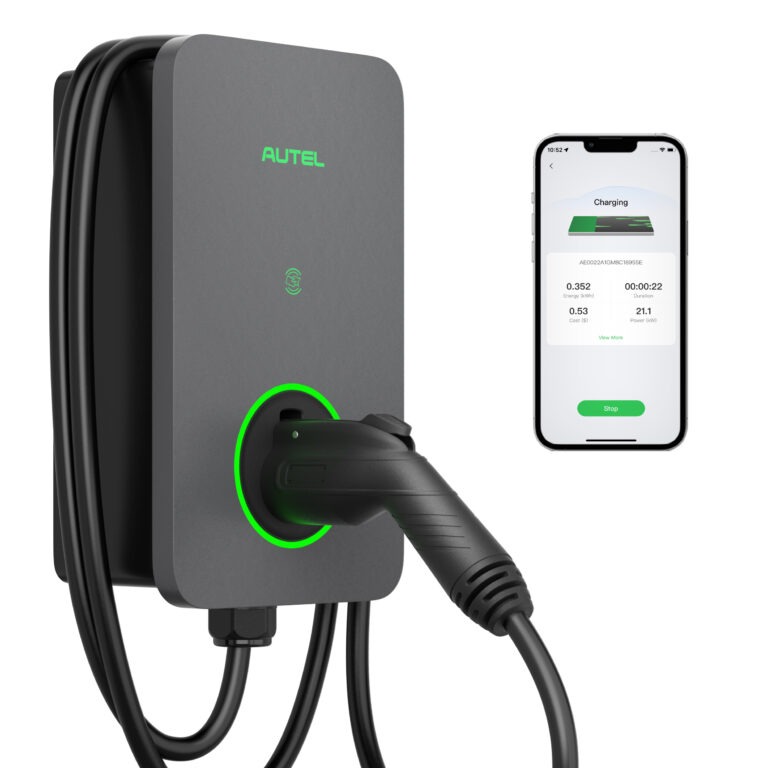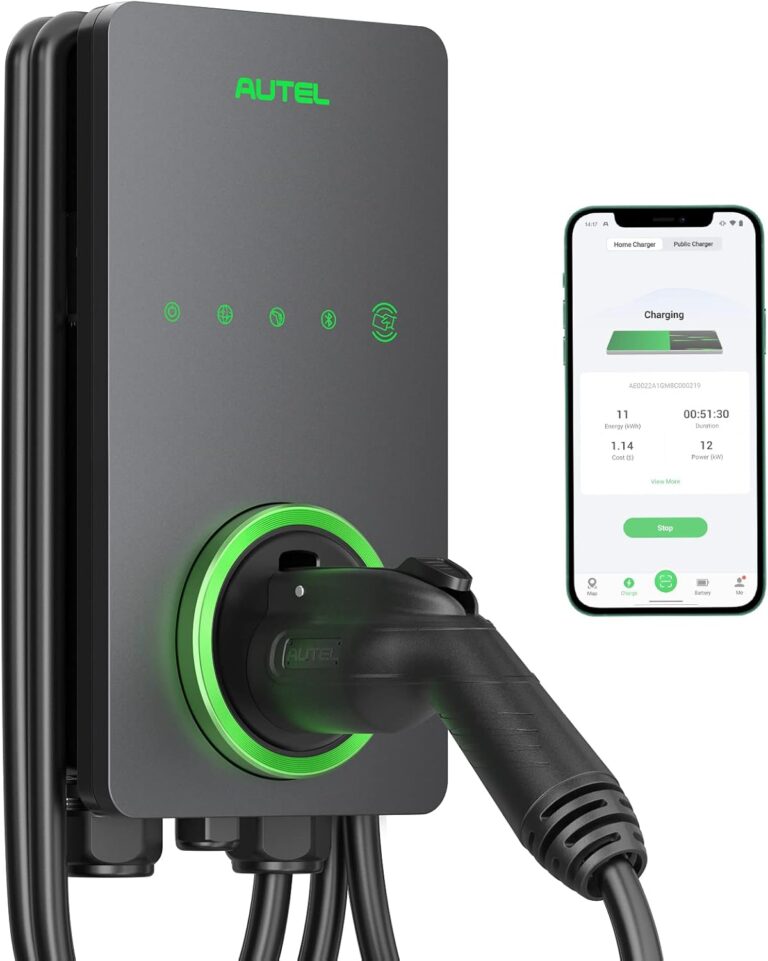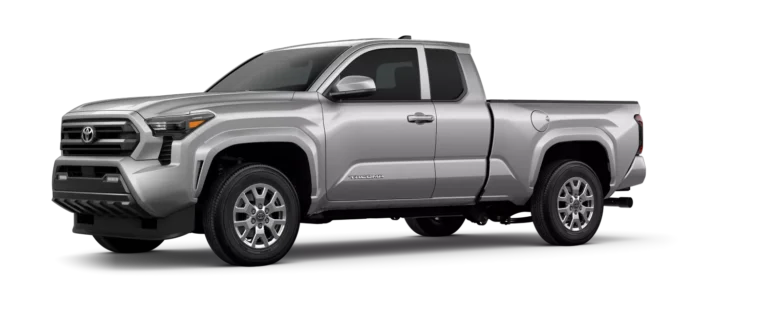
Nissan EV Home Charging - How To!
- Last Updated
- December 13, 2024
After clicking ‘Check Any VIN number,’ enter your VIN and email address in the top right corner of the page.
Your Ultimate Nissan EV Home Charging Guide!
Hey Nissan EV owners! Are you looking for a “How To” guide on all things Nissan EV?
In this guide, we explore the top home charging stations for Nissan EVs, emphasizing key features like charging speed, ease of use, and long-term reliability.
We’ll also delve into some of those FAQ’s that are often asked with Nissan EV’s. Keep reading for more.
Best Nissan EV Chargers: Our Top Picks!
Best Nissan EV Charger
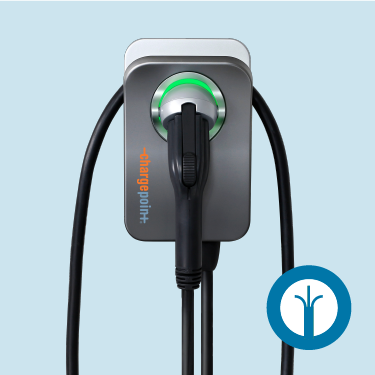
ChargePoint Home Flex Level 2
- Charging Speed: Up to 12kW (50 amps)
- Compatibility: Type 1 (J1772)
- Warranty: 3 years
- Smart Features: Yes (WiFi, App)
- Installation Time: Typically under 3 hours
- Cable Length: 23-feet
- Reviews: 3000+ 4.5 Stars
The ChargePoint Home Flex Level 2 is a dependable and adaptable EV charger suited for charging a range of vehicles, including electric models like the Nissan Leaf and hybrid cars. Delivering up to 50 amps of power, it offers faster charging than standard Level 1 chargers, making it a practical option for Nissan EV owners needing efficient recharging between commutes or longer drives.
Home EV chargers such as the ChargePoint Home Flex are recognized for features like adjustable power settings, compatibility with all electric vehicles, and smart connectivity. This model supports a range of amperage levels (16A to 50A) and integrates Wi-Fi, allowing users to monitor and control charging sessions through a smartphone app. This versatility makes it an effective solution for households with Nissan EVs or those planning to add additional electric vehicles to their garage.
The ChargePoint Home Flex includes safety mechanisms and energy-efficient scheduling features, enabling users to optimize charging times to align with off-peak electricity rates. Its compact design, combined with installation flexibility (available as a plug-in or hardwired setup), ensures it fits seamlessly into garage or driveway spaces. With regular care and proper usage, it can remain a reliable part of your Nissan EV charging routine for many years.
Adjustable amperage from 16A to 50A, providing up to 37 miles of range per hour of charging.
Compatible with all electric vehicles that use a J1772 connector (most EVs).
Requires a dedicated 40-amp circuit; may need a licensed electrician for installation.
- Adjustable amperage for flexibility in charging speeds.
- Smart features for scheduling and tracking charging.
- Compact design for easier installation.
- Higher installation costs due to electrical upgrades.
- Requires a Wi-Fi connection for full functionality.
- You need a fast, reliable charger for any EV model. The ChargePoint Home Flex is compatible with all electric vehicles and can charge them up to 9x faster than Level 1 chargers.
- You want smart charging features. The ChargePoint app allows you to monitor charging sessions, set charging schedules, and track energy usage remotely.
- You’re looking for flexibility. With its adjustable amperage settings, you can optimize charging for your home’s electrical system and vehicle needs.
Best Budget EV Charger For Nissan
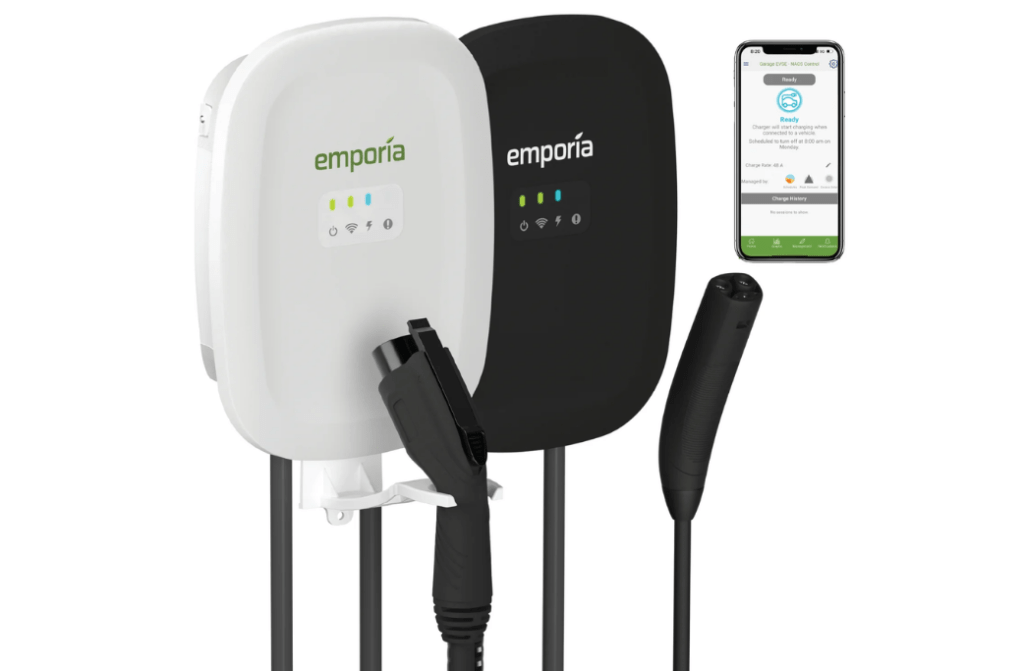
Emporia Level 2 EV Charger
- Charging Speed: 11.5 kW (48 amps)
- Compatibility: Type 1 (J1772)
- Warranty: 3 years
- Smart Features: Yes (Energy Monitoring)
- Installation Time: Typically under 2 hours
- Cable Length: 24-feet
- Reviews: 2000+ 4.7/5 Stars
The Emporia Level 2 EV Charger provides an efficient and energy-conscious charging solution for EV owners, including Nissan models like the Leaf and Ariya. With a 48-amp capacity delivering up to 9.6 kW of power, it offers approximately 46 miles of range per hour, making it a practical choice for home charging to ensure your Nissan EV is ready when you need it.
A standout feature of the Emporia EV Charger is its smart app integration, which allows users to monitor charging sessions, track energy consumption, and set charging schedules to benefit from off-peak electricity rates. This functionality can help Nissan EV owners reduce long-term charging costs. Additionally, the charger is compatible with Emporia’s energy management system, enabling integration with solar power and other energy-saving tools to optimize overall household energy use.
The Emporia Level 2 Charger is UL-certified and weatherproof, making it suitable for both indoor and outdoor installations. Its straightforward plug-in or hardwired installation process ensures it fits seamlessly into garages or parking spaces. With its durable design and versatile functionality, this charger is a reliable addition to any Nissan EV owner’s charging setup.
Up to 48 amps; charges most EVs from empty to full in about 8 hours.
Works with all J1772 compatible EVs. (Most EVs)
Requires a dedicated 40-amp circuit; professional installation recommended.
- Smart charging features for efficient energy use.
- High amperage allows for faster charging.
- Compact design for easy installation.
- Requires a dedicated circuit, which can add to installation costs.
- Limited availability in some regions.
- You want to save on energy costs by setting charging schedules and tracking your usage via a smart app.
- You are interested in integrating your EV charging with a broader home energy management system, including solar power.
- You’re looking for a high-powered, reliable charger with flexible installation options for both indoor and outdoor use.
Most Compact EV Charger For Nissan
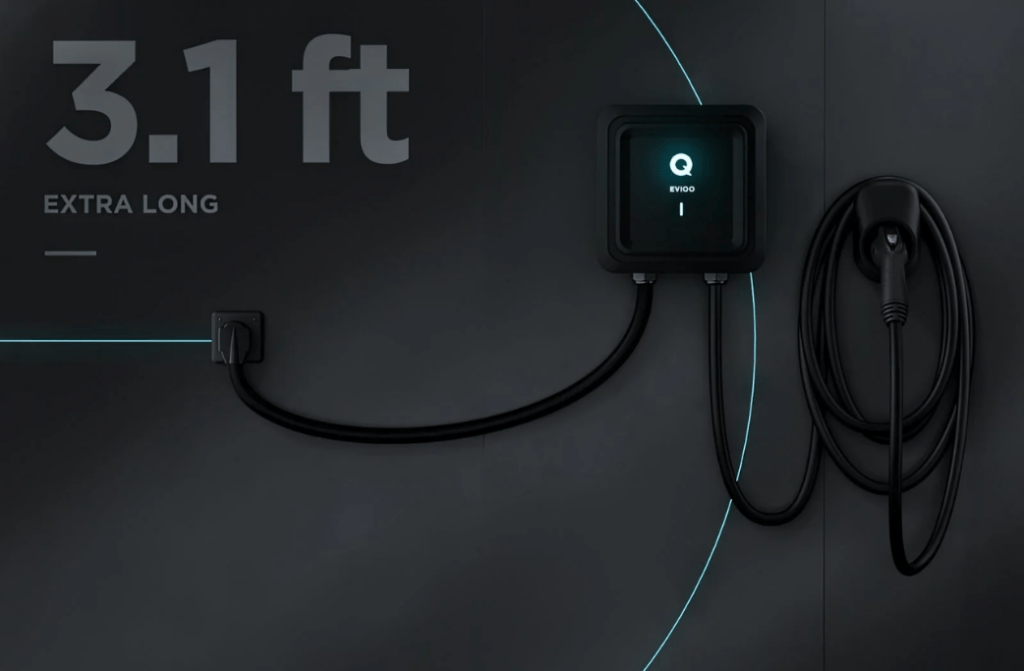
EVIQO Level 2 EV Wall Charger
- Charging Speed: Up to 48 amps (11.5kW)
- Compatibility: Type 1 (J1772)
- Warranty: 3 years
- Smart Features: Yes (WiFi, App)
- Installation Time: Typically under 2 hours
- Cable Length: 25 feet
- Reviews: 750+ 4.9/5 Stars
The EVIQO Level 2 Charger provides a reliable and efficient charging solution, delivering up to 40 amps of power to meet the needs of your Nissan EV. Capable of providing approximately 30 miles of range per hour, it ensures quick and consistent charging, whether at home or in a commercial setting.
What makes the EVIQO charger stand out is its straightforward design. With a sleek, weather-resistant housing, it is suitable for both indoor and outdoor installations. Its user-friendly plug-in setup offers flexibility, allowing for easy installation in a garage or driveway without requiring extensive electrical work. The ergonomic connector and long cable provide added convenience, ensuring you can charge your Nissan EV comfortably and without hassle.
Built with durability in mind, the EVIQO Level 2 Charger requires minimal maintenance, making it an ideal choice for Nissan EV owners looking for a long-term, low-maintenance charging solution. Its compatibility with all standard EV models ensures versatility, making it a dependable option for any charging setup.
Charges at 32 amps; provides up to 25 miles of range per hour.
Compatible with all J1772 vehicles. (Most EVs)
Requires a 40-amp circuit; professional installation is advised.
- Reliable performance with user-friendly features.
- Good balance of price and charging speed.
- Lightweight design for easier handling.
- Less known brand may lack some consumer confidence.
- Slower than higher amp chargers.
- You want a straightforward, reliable EV charger that provides fast, consistent charging.
- You need a durable, weatherproof charger for indoor or outdoor use, with easy installation.
- You value flexibility with a long cable and a no-fuss setup that doesn’t require complex wiring.
Table of Contents
How Much Does It Cost to Install a Home Charger For A Nissan EV?
Charger Cost
- Level 1 Chargers: Usually included with your Nissan EV and plug into a standard 120V outlet. These chargers are slow but don’t require additional installation costs.
- Level 2 Chargers: These chargers, which provide faster charging, cost between $300 and $1,200, depending on the brand, amperage, and additional features (e.g., Wi-Fi connectivity).
Permits and Inspection
- Many U.S. states require permits for electrical upgrades, adding $50 to $200.
- Inspections may also be needed to comply with local codes, depending on your municipality.
Federal and State Incentives
To reduce costs, you may qualify for federal or state incentives, such as:
- Federal Tax Credit:
- The Alternative Fuel Vehicle Refueling Property Credit offers a tax credit of up to 30% of installation costs (maximum $1,000).
- State Rebates:
- Programs vary by state. For example, California offers rebates through the Clean Vehicle Rebate Project, and New York has similar programs under NYSERDA. Check your state’s specific EV incentives.
- Federal Tax Credit:
Ongoing Costs
- Electricity Usage: Charging your Nissan EV at home increases electricity bills, typically costing $10 to $20 per full charge, depending on local electricity rates.
- Smart Features: Some chargers allow scheduling for off-peak hours to save on utility costs.
Estimated Total Cost
The total cost to install a Level 2 home charger for a Nissan EV in the U.S. typically falls between $800 and $3,500, depending on the factors mentioned.
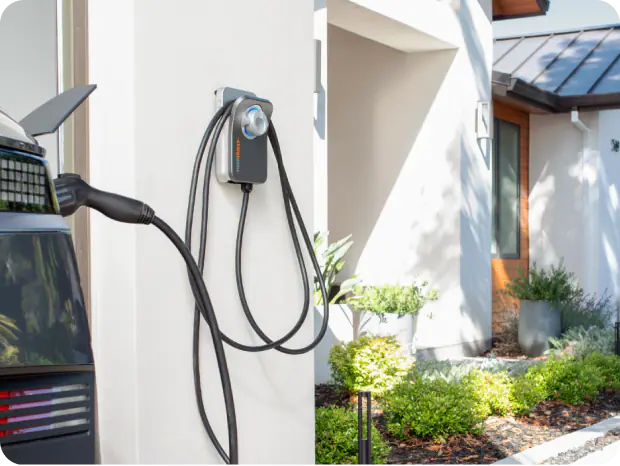
Cost of Charging A Nissan EV vs Public Charging
Cost Of Charging A Nissan EV at Home
Cost
- Electricity Rates: U.S. residential electricity averages $0.15 per kWh, but rates can range from $0.10 to $0.30 per kWh depending on your state.
- Nissan Leaf Example:
- Battery capacity: 40 kWh (standard model).
- Cost per full charge: 40 kWh×0.15 USD/kWh=6.00 USD40
- Estimated range: ~149 miles.
Key Benefits
- Lower Costs: Charging at home is often cheaper than public charging.
- Off-Peak Savings: Time-of-use (TOU) rates can lower costs further, with off-peak rates as low as $0.09 per kWh in some areas.
- Convenience: Charge overnight without leaving home.
Downsides
- Initial Investment: Installing a home Level 2 charger costs $800–$3,500, but this pays off in the long run.
Cost Of Charging A Nissan EV At Public Charging
Costs
Charging Networks: Prices vary by provider (e.g. Electrify America/ ChargePoint).
- DC Fast Charging (Level 3): ~$0.30–$0.50 per kWh.
- Level 2 Charging: ~$0.15–$0.30 per kWh.
Nissan Leaf Example (DC Fast Charger):
- Battery capacity: 40 kWh.
- Cost per full charge: 40 kWh×0.40 USD/kWh=16.00 USD40
- Estimated range: ~149 miles.
Key Benefits
- Speed: DC fast chargers can provide an 80% charge in about 40 minutes for most Nissan EVs.
- Availability: Useful for long trips or emergencies.
Downsides
- Higher Costs: Public charging is often 2–3 times more expensive than charging at home.
- Membership Fees: Some networks charge monthly fees for lower per-kWh rates.
EV Summary Comparison
| Category | Home Charging | Public Charging |
|---|---|---|
| Cost per kWh | ~$0.10–$0.30 | ~$0.30–$0.50 (DC Fast) |
| Cost per Full Charge | ~$4–$12 | ~$12–$20 |
| Cost per Mile | ~$0.03–$0.05 | ~$0.08–$0.12 |
| Speed | Slower (Level 2: 6–8 hrs) | Faster (DC Fast: ~40 mins) |
| Convenience | Charge at home overnight | Requires traveling to a station |
What Type Of Charger Can A Nissan EV Use?
Nissan Leaf:
- Level 1: Uses a standard 120V outlet.
- Level 2: Uses the J1772 connector (most common for home charging).
- DC Fast Charging: Uses CHAdeMO connector.
Nissan Ariya:
- Level 1: Uses a standard 120V outlet.
- Level 2: Uses the J1772 connector (like the Leaf).
- DC Fast Charging: Can use CCS connectors (depending on the region and vehicle version).
Can I Use a Public Charger For My Nissan EV, And Is It Faster?
Yes, you can absolutely use a public charger for your Nissan EV, and it can often be faster than charging at home, depending on the type of charger you use. Here’s a breakdown:
Types Of Public Chargers For Nissan EVs
Level 2 Public Chargers (240V)
- Connector: J1772
- Charging Speed: Typically adds 15–30 miles of range per hour of charging.
- Where to Find: These chargers are widely available at public charging stations in cities, shopping centers, workplaces, and public parking areas.
- Speed Comparison: Faster than Level 1 chargers (standard home outlets), but not as fast as DC Fast Chargers. Level 2 charging can typically charge your Nissan EV overnight or during a few hours of parking.
DC Fast Chargers (Level 3)
- Connector: CHAdeMO (for Nissan Leaf) or CCS (for newer Nissan models like the Ariya, depending on the region).
- Charging Speed: Can add up to 80% of your battery charge in about 30 minutes (depending on the charger and battery capacity).
- Where to Find: DC Fast Chargers are commonly located along highways for long road trips, at service stations, or certain public charging stations.
- Speed Comparison: Significantly faster than both Level 1 and Level 2 chargers. If you’re in a rush or on a long trip, a DC Fast Charger is ideal for quickly getting back on the road.
What Charging Apps Work Best With Nissan EV's?
NissanConnect EV
- Nissan’s Official App: Nissan provides its own app, NissanConnect EV, which allows you to monitor and manage your Nissan EV charging.
- Features:
- Start/Stop Charging Remotely: You can start or stop your charging sessions directly from the app.
- Charge Status and Battery Information: It provides real-time data about your battery status, charge level, and estimated range.
- Scheduled Charging: Allows you to schedule charging for off-peak hours to save on energy costs.
- Find Charging Stations: The app helps you find nearby charging stations compatible with your Nissan EV.
- Best For: Nissan-specific features and controls for your EV’s charging, battery, and scheduling.

PlugShare
- Overview: PlugShare is a widely-used app that provides information about charging stations from all major networks and locations.
- Features:
- Find Nearby Charging Stations: PlugShare shows a map of Level 1, Level 2, and DC Fast Charging stations, including user reviews and real-time availability.
- User Reviews and Photos: Offers feedback from other users, so you can check if a station is working properly or if it’s accessible.
- Filter by Charger Type: You can filter charging stations by connector type (such as J1772 for Level 2 chargers or CHAdeMO for DC Fast Charging, compatible with Nissan Leaf).
- Best For: Locating public chargers and monitoring their availability in real-time.
ChargePoint
- Overview: ChargePoint is one of the largest networks of public chargers, including Level 2 and DC Fast Chargers.
- Features:
- Locate Charging Stations: Helps you find ChargePoint stations nearby and even provides real-time information about charger availability.
- Payment Integration: Allows you to pay for charging directly through the app, eliminating the need for separate cards or memberships.
- Charging History: Tracks your charging sessions and provides information about costs, times, and energy used.
- Schedule Charging: You can reserve chargers ahead of time in some locations.
- Best For: Easy access to a large network of chargers and convenient payment options.
EVgo
- Overview: EVgo is a popular charging network, particularly for DC Fast Chargers, which is ideal for quickly charging Nissan EVs.
- Features:
- Locate Fast Chargers: Provides real-time maps of EVgo’s DC Fast Chargers, ideal for quick charging.
- Pricing Transparency: Displays pricing for each charging session, so you know exactly how much you’re paying.
- Charger Availability: You can see if a charger is available and plan accordingly.
- Best For: Fast charging on long trips, particularly with DC Fast Chargers (CHAdeMO connector, which works for the Nissan Leaf).
Greenlots
- Overview: Greenlots is another charging network that focuses on providing public charging stations.
- Features:
- Find Nearby Stations: Helps you locate Level 2 and DC Fast Charging stations.
- Mobile Payment: Allows you to pay for charging sessions via the app, making it easy to charge without needing a physical card.
- Charger Availability: Provides real-time information on charger availability.
- Best For: Fast and convenient charging for both Level 2 and DC Fast Chargers.
Discover the value of your cars options and specification!
- Select from thousands of vehicles and options
- See how each option adds value to your car
- Discover which tech features add a premium
- Spot which options hold their value over time
- Find out if that 'Sport' package pays off later
- Identify high value features others miss
$355 $354 $353 $352 $351 $350
Can you charge a Nissan EV at Tesla chargers?
Not the best idea, honestly. It’s not straightforward due to differences in the charging connectors and network restrictions. Let me break it down for you.
Charging Connector Differences
- Tesla Chargers (Superchargers) use a proprietary connector that is different from the standard connectors used by most other EVs, including Nissan. In the US, Tesla uses its own Tesla connector for its Supercharger network, while Nissan typically uses the CHAdeMO connector for DC fast charging.
- However, Tesla has started to open its Supercharger network to non-Tesla vehicles in some regions, but this depends on specific locations and whether the appropriate adapter or system is available.
Compatibility
- CHAdeMO to Tesla Adapter: For older Nissan EVs (like the Nissan Leaf), you would need a CHAdeMO-to-Tesla adapter to charge at a Tesla Supercharger, if the Supercharger station supports this type of charging. These adapters are available for purchase from third-party suppliers.
- Tesla’s Open Network: In some places, Tesla has been opening up its Supercharger network to non-Tesla EVs, but the vehicles must have the correct charging adapter or be compatible with the Supercharger network’s updated infrastructure.
Charging Speed
- CHAdeMO to Tesla Adapter: For older Nissan EVs (like the Nissan Leaf), you would need a CHAdeMO-to-Tesla adapter to charge at a Tesla Supercharger, if the Supercharger station supports this type of charging. These adapters are available for purchase from third-party suppliers.
- Tesla’s Open Network: In some places, Tesla has been opening up its Supercharger network to non-Tesla EVs, but the vehicles must have the correct charging adapter or be compatible with the Supercharger network’s updated infrastructure.

What Is The Life Expectancy Of Nissan EV Batteries?
The life expectancy of Nissan EV batteries, such as those used in models like the Nissan Leaf, generally ranges from 8 to 15 years, depending on several factors.
- Nissan EVs, like the Leaf, typically use lithium-ion (Li-ion) batteries, which are known for their durability and long life. While these batteries degrade over time, they are designed to retain a significant portion of their capacity for many years.
- Extreme temperatures can affect battery health. High temperatures, in particular, can cause the battery to degrade faster. Nissan EVs in regions with mild climates tend to experience slower battery degradation compared to those in extremely hot or cold areas.
- Battery thermal management: Modern Nissan EVs are designed with cooling systems to help maintain battery temperature and prevent overheating, which helps prolong the battery’s life.
The way you charge your Nissan EV plays a role in the lifespan of its battery:
- Frequent fast charging (DC fast charging) can cause more wear on the battery compared to Level 2 charging, which is slower and gentler.
- Avoiding deep discharges (charging when the battery is very low) and keeping the charge level between 20-80% can help extend battery life.
How long to charge a nissan EV on a 110V outlet?
Charging a Nissan EV on a 110V outlet (also known as a standard Level 1 charger) is the slowest method of charging. The time it takes to charge depends on the battery size of your specific Nissan EV model, as well as the current charge level of the battery.
Here’s an estimate of how long it takes to charge a Nissan EV on a 110V outlet:
Nissan Leaf (24 kWh Battery)
- Charging Speed: A 110V outlet typically provides around 1.4 miles of range per hour of charging.
- Full Charge Time: If the battery is completely empty, it would take approximately 20-24 hours to fully charge from 0% to 100%.
Nissan Leaf (40 kWh Battery)
- Charging Speed: Around 2-3 miles of range per hour on a 110V outlet.
- Full Charge Time: A full charge could take between 30-36 hours, depending on the battery’s starting charge level.
Nissan Leaf (62 kWh Battery, newer models)
- Charging Speed: Around 3-4 miles of range per hour on a 110V outlet.
- Full Charge Time: It may take 40-50 hours to fully charge from empty to full.

How Do I Set Up The Nissan Connect EV App?
Download the NissanConnect EV App
- Go to the App Store (iOS) or Google Play Store (Android).
- Search for NissanConnect EV and download the app to your smartphone.
Create an Account or Sign In
- Open the NissanConnect EV app after installation.
- You’ll be prompted to create an account if you don’t already have one. Enter your email address, create a password, and follow the on-screen instructions to complete the registration process.
- If you already have a NissanConnect account, simply log in using your existing credentials.
Add Your Nissan EV
After logging in, you’ll need to add your Nissan EV to the app:
- Select “Add Vehicle” or a similar option.
- Enter your vehicle identification number (VIN), which can be found on your vehicle’s dashboard or driver’s side door frame.
- Follow the prompts to connect your Nissan EV to the app.
Connect Your Nissan EV to the App
- Bluetooth: The app will likely require Bluetooth to communicate with your vehicle, so make sure Bluetooth is enabled on your phone.
- Follow the on-screen instructions to pair the app with your car. You may need to confirm the pairing inside your vehicle or on your phone.
Set Up Vehicle Preferences
Once your Nissan EV is connected, you can customize settings:
- Charging: Set up charging schedules, check the battery level, and monitor charging progress.
- Climate Control: Pre-condition the cabin by setting up remote start and climate control.
- Location: Set your home address or favorite locations for easier navigation.
- Notifications: Customize alerts for things like battery charge levels, charging completion, or when your car is fully charged.
Nissan Customer Support
Nissan United States Customer Support
- Phone Number: 1 (800) 647-7261
- Website: www.nissanusa.com/contact-us
Nissan Financial Services (Nissan Credit) Customer Support
Phone Number: 1 (800) 456-6622
Website: www.nissanfinance.com
Nissan Roadside Assistance
Phone Number: 1 (877) 647-7456
Nissan Connect Services Support
Phone Number: 1 (877) 664-2008
Website: www.nissanusa.com/connect
Nissan Fleet Customer Support (for businesses)
Phone Number: 1 (877) 668-2595
Website: www.nissanusa.com/fleet

Article By: Dale Ogden
Dale is a recognized expert in the automotive industry, known for his expertise in automotive asset management and consulting.
As the founder of Check Your Spec and former Forecast Manager at CAP HPI (equivalent to Kelley Blue Book in the USA) he made significant contributions to the development of forecasting strategies and depreciation models for internal combustion engines, hybrid, and electric commercial vehicles in the UK.
With over two decades of experience, Dale pioneered EV forecasting models that are now used by leading manufacturers.
His work has also produced residual values for over 10,000 new vehicles.
Nissan EV FAQ
How much does it cost to charge a Nissan LEAF at home?
The cost of charging your Nissan LEAF at home depends on your electricity rate and the battery size of your LEAF model. Here’s an estimate based on average U.S. electricity costs:
- Average home electricity rate: $0.13 per kWh.
- Nissan LEAF battery capacity:
- 40 kWh for the standard model.
- 62 kWh for the longer-range model (Nissan LEAF Plus).
Using the standard 40 kWh battery as an example, a full charge would cost around:
- 40 kWh x $0.13 = $5.20 for a full charge.
For the 62 kWh battery:
- 62 kWh x $0.13 = $8.06 for a full charge.
Charging costs can vary based on local electricity rates, the battery’s charge level, and the specific model of the LEAF.
Can I charge a Nissan LEAF at a home outlet?
Yes, you can charge a Nissan LEAF at a standard 120V home outlet (Level 1 charger). However, charging with a 120V outlet is much slower compared to other methods like Level 2 chargers. Charging on a 120V outlet can add approximately 4 to 5 miles of range per hour of charging, meaning it could take 20-30 hours for a full charge depending on the battery size and current charge level.
What kind of charger does the 2024 Nissan LEAF use?
The 2024 Nissan LEAF uses a Level 1 (120V) or Level 2 (240V) charger for home charging. For faster charging, a Level 2 charger is recommended, as it delivers higher power and charges the vehicle much more quickly (up to 25 miles of range per hour for the standard 40 kWh model). For public charging, the LEAF is also compatible with DC fast chargers, which can charge the battery to around 80% in 40-60 minutes.
Do I need an app to charge my Nissan LEAF?
No, you do not need an app to charge your Nissan LEAF. However, the NissanConnect EV app can provide convenience by allowing you to remotely monitor and control charging, set charging schedules, and check battery status. The app is optional but helpful for managing charging times and receiving notifications.
Is a Level 2 charger included when I buy an electric Nissan?
Typically, Nissan does not include a Level 2 charger when you purchase an electric vehicle like the Nissan LEAF. A Level 2 charger (240V) must generally be purchased separately and installed in your home by a licensed electrician. Some dealerships may offer a home charging package that includes a Level 2 charger at an additional cost, but this is not typically part of the standard vehicle purchase.

Unlock accurate valuations for your car’s features in seconds – find out what your options are worth today and in the future.


